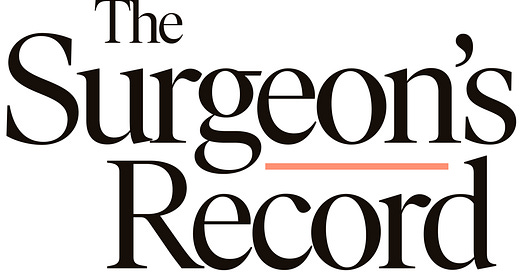A weekly rundown of stories from across the healthcare ecosystem — health tech, health policy, digital health, value-based care, and more — with commentary.
Presented by Commons Clinic
This week:
A double helping of health policy smackdowns from Professor Ge Bai
More Medicare Advantage shenanigans
Is Value-Based Care killing small independent practices?
Another digital health unicorn has its horn trimmed
It’s not artificial intelligence, it’s brain surgery
ICYMI: A week in the life of a surgeon innovator
The conundrum of health care price regulation (STAT)
This first piece highlights what many have long understood — well-intentioned healthcare legislation often produces unintended consequences that stifle innovation and allow incumbents to tighten their grip. In this case, Dr. Bai argues that price regulation is a dead end that leads to increasing complexity and consolidation with diminished competition. As she often does, Dr. Bai makes a compelling case for the power of free market forces and competition in healthcare. I tend to agree — but we have a long way to go. There are strong incentives for incumbents to maintain the status quo.
Rationalizing Physician Regulation (Health Affairs)
Along the same lines, this second piece details the unintended consequences of regulations meant to curb physician bad behavior. Specifically CON requirements, Stark Laws, and the ACA ban on POHs — all of which have either failed to achieve their intended goals and/or have worsened the problem. That legislators continue to cling to ineffective regulations makes me wonder if they’re really all that serious about fixing healthcare. All solutions should be on the table. Meanwhile, costs keep going up and we’re no closer to a solution. (More detailed comments here.)
Feds Killed Plan To Curb Medicare Advantage Overbilling After Industry Opposition (KFF Health News)
Turns out CMS had an opportunity to curb Medicare Advantage abuse 10 years ago but succumbed to industry pressure. Now, a decade later, the Justice Department is trying to recoup $2 billion from UHG for (allegedly) fraudulent claims. Apparently, it’s a lot easier for CMS to tell physicians “tough luck” than to hold the line with insurance companies. Even more damning, CMS thought its policy was the right thing to do but opted not to move forward because of stakeholder pressure. In summary, CMS clings to ineffective, unnecessarily restrictive, physician-averse legislation while caving to large incumbents. If they want to retroactively admit a mistake with Medicare Advantage policy, why stop there? Time to take another look at CONs, POHs, and Stark while you’re at it.
Is VBC secretly anti-independent practices? Success in value-based programs requires infrastructure that's hard to build as a small provider. The financials of implementing tech platforms, hiring clinical/admin staff to manage everything, and tapping regulatory/legal expertise aren’t favorable unless you can leverage economies of scale. Until now, provider-focused programs have largely been voluntary. If they become mandatory, small independent practices may be forced to consolidate to avoid being crushed by downside risk. CMS/CMMI should be monitoring these programs to make sure current models aren't driving more consolidation — and the increased costs that come with it. They should also be open to learning from models/organizations that are achieving value without gaming the system (see above re: Medicare Advantage).
Scoop: Telehealth company Truepill gets swallowed for $525 million (Axios)
One valued at $1.6 billion, Truepill is reportedly being acquired by LetsGetChecked for $525 million — a 67% discount. (Rumors floating around social media suggest Truepill’s founders got nothing in the sale). Both companies are burning cash and losing money. The hope is that a merger will create a more stable, sustainable business model. Truepill is no stranger to controversy, and the company bet heavily on a telemedicine future that never materialized and seems unlikely. More health tech M&A is expected as the sector continues to come down from the dizzying funding/valuation highs of a few years ago. The lessons: get profitable, scale responsibly, and solve real problems. And — healthcare inertia is strong and difficult to overcome.
Why AI will never replace brain surgeons (Boston Globe)
A beautifully written piece — the art of medicine from the perspective of a neurosurgeon delicately removing a brain tumor. Though we’re a bit too far into the hype cycle, I don’t doubt that AI will do great things in healthcare. But, in my own practice, I’m constantly reminded that patients and healthcare interactions cannot be predictably reduced to 1s and 0s. This same issue surfaces repeatedly in my role as a health tech advisor. Attempts to sort patients into predictable, reproducible subsets (often for purpose of facilitating tech) are quickly sabotaged by the unpredictability of the human condition. Patients and their conditions don’t follow established rules. The answer, of course, lies somewhere in between the science and the art of medicine. The future belongs to doctors and technologists capable of existing in the fuzzy middle.
A Week in the Life (The Surgeon’s Record)
My own take on running an efficient Orthopedic practice while balancing side gigs, my personal wellbeing, and family life. Something I didn’t cover — the dichotomy between my day job and my side gigs. While some of the people I work with on the frontlines follow my non-clinical work, many are oblivious to the healthcare innovation ecosystem. VCs, startups, fundraising, digital health, and health policy issues like AI regulation, Medicare Advantage controversies, and value-based care mean little to them. On the flipside, my day job seems nebulous to non-clinical people I encounter doing side gig stuff. I consider the ability to bridge this gap a key differentiator — my secret sauce.






